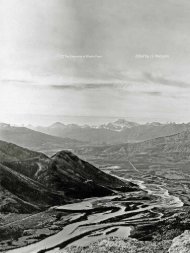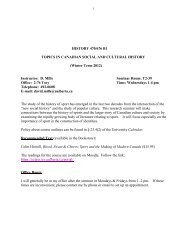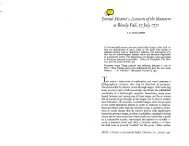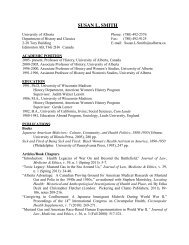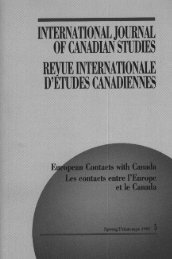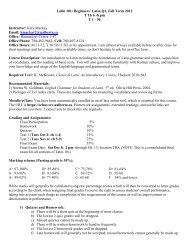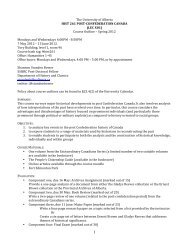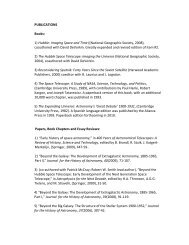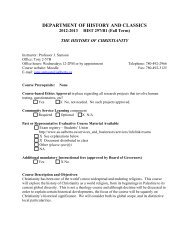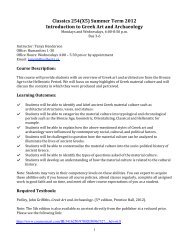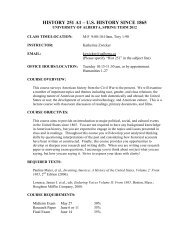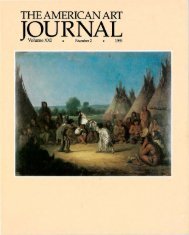- Page 1 and 2:
&I,",,~C Ihe Ladies c cu. V'VVAN[s.
- Page 4:
This page intentionally left blank
- Page 8:
Published byThe University of Alber
- Page 12:
For Margaret
- Page 16:
VIIITHE LADIES, THE GWICH'IN, AND T
- Page 20:
XTHE LADIES, THE GWICH'IN, AND THE
- Page 24:
This page intentionally left blank
- Page 28:
XIVTHE LADIES, THE GWICH'IN, AND TH
- Page 32:
XVITHE LADIES, THE GWICH'IN, AND TH
- Page 36:
XVIIITHE LADIES, THE GWICH'IN, AND
- Page 40:
XXTHE LADIES, THE GWICH'IN, AND THE
- Page 44:
XXIITHE LADIES, THE GWICH'IN, AND T
- Page 48:
XXIVTHE LADIES, THE GWIGH'IN, AND T
- Page 52:
XXVITHE LADIES, THE GWICH'IN, AND T
- Page 56:
XXVIIITHE LADIES, THE GWICH'IN, AND
- Page 60:
XXXTHE LADIES, THE GWICH'IN, AND TH
- Page 64:
XXXIITHE LADIES, THE GWICH'IN, AND
- Page 68:
XXXIVTHE LADIES, THE GWICH'IN, AND
- Page 72:
XXXVITHE LADIES, THE GWICH'IN, AND
- Page 76:
XXXVIIITHE LADIES, THE GWICH'IN, AN
- Page 80:
XLTHE LADIES, THE GWICH'IN, AND THE
- Page 84:
XUITHE LADIES, THE GWIGH'IN. AND TH
- Page 88:
XLIVTHE LADIES, THE GWICH'IN, AND T
- Page 92:
XLVITHE LADIES, THE GWICH'IN, AND T
- Page 96:
XLVIIITHE LADIES, THE GWICH'IN, AND
- Page 100:
LTHE LADIES, THE GWICH'IN, AND THE
- Page 106:
~ ContentsIDreaming of the Journey2
- Page 110:
In 1913 a school-friend of mine wen
- Page 114:
DreamingoftheJoumry 3Such is the tr
- Page 118:
5~ * PlantheSo there we were throug
- Page 122:
We Plan theJournry 7and then only f
- Page 126:
WePlan theJoumry 9the wing" or "bet
- Page 130:
II(3 Southam tonto EdmontonDiary. M
- Page 134:
Southampton to Edmonton 13our eyes.
- Page 138:
Southampton to Edmonton 15memory bu
- Page 142: (4 OutWe nee de d all 0 U r wit s a
- Page 146: Outfitting in Edmonton 19H.A. 0 (Ha
- Page 150: Outfitting In Edmonton 21North Sask
- Page 154: 23(5 Lure 0the NorthDuring the jour
- Page 158: Lure of the North 25as the Indian t
- Page 162: Lure of the North '2, 7Slowly the s
- Page 166: 29(Ei_D~a~s ____ ~ ____ ~AshoreWe 0
- Page 170: D.rysAshore 31Long after midnight w
- Page 174: D'OY,Ashore 33this calendar.' 'God
- Page 178: DcrysAshore 35to several, including
- Page 182: 37Great SlaveLakeIt was 9 in the ev
- Page 186: Great Slave Lake 39preparation, dis
- Page 190: 41(8 In and OutThe leisured tourist
- Page 196: 4 4 T H E L A D I E S , T H E G W I
- Page 200: 46 THE LADIES, THE GWICH'IN, AND TH
- Page 204: 48 THE LADIES, THE GWICH'IN, AND TH
- Page 208: 50 THE LADIES , THE G WI C H'IN . A
- Page 212: 52 THE LADIES, THE GWICH'IN, AND TH
- Page 216: 54 THE LADIES, THE GWICH'IN, AND TH
- Page 220: 56 THE LADIES, THE GWICH'IN, AND TH
- Page 224: 58 THE LADIES, THE GWICH'IN, AND TH
- Page 228: 60 THE LADIES, THE GWICH'IN, AND TH
- Page 232: 62 THE LADIES, THE GWICH'IN, AND TH
- Page 236: This page intentionally left blank
- Page 240: 66 THE LADIES, THE GWICH'IN, AND TH
- Page 244:
68 THE LADIES, THE GWICH'IN, AND TH
- Page 248:
70 THE LADIES, THE GWICH'IN, AND TH
- Page 252:
72 THE LADIES , THE GWICH ' IN, A N
- Page 256:
74 THE LADIES, THE GWlCH ' lN, AND
- Page 260:
This page intentionally left blank
- Page 264:
78 THE LADIES , THE GWICH ' I N, A
- Page 268:
80 THE LADIES, THE GWICH'IN, AND TH
- Page 272:
82 THE LADIES, THE GWICH'IN, AND TH
- Page 276:
This page intentionally left blank
- Page 280:
86 THE LADIES, THE GWIGH'IN, AND TH
- Page 284:
88 THE LADIES, THE GWICH'IN, AND TH
- Page 288:
goTHE LADIES, THE GWICH'IN, AND THE
- Page 292:
92 THE LADIES, THE GWICH'IN, AND TH
- Page 296:
94 THE LADIES, THE GWICH'IN, AND TH
- Page 300:
96 THE LADIES, THE GWICH'IN, AND TH
- Page 304:
98 THE LADIES, THE GWICH'IN, AND TH
- Page 308:
100 THE LADIES, THE GWICH'IN, AND T
- Page 312:
I02THE LADIES, THE GWICH'IN, AND TH
- Page 316:
104 THE LADIES, THE GWICH'IN, AND T
- Page 320:
106 THE LADIES, THE GWICH'IN, AND T
- Page 324:
108 THE LADIES, THE GWICH'IN, AND T
- Page 328:
lIOTHE LA DIES, THE GWICH'I N, AND
- Page 332:
II2THE LADIES, THE GWICH'IN, AND TH
- Page 336:
This page intentionally left blank
- Page 340:
II6THE LADIES , THE GWICH'IN, AND T
- Page 344:
lI8THE LADIES, THE GWICH'IN, AND TH
- Page 348:
120 THE LADIES, THE GWICH'IN, AND T
- Page 352:
122 THE LADIES, THE GWICH'IN, AND T
- Page 356:
124 THE LADIES, THE GWICH'IN, AND T
- Page 360:
This page intentionally left blank
- Page 364:
128 THE LADIES, THE GWICH'IN, AND T
- Page 368:
130 THE LADIES, THE GWICH'IN, AND T
- Page 372:
This page intentionally left blank
- Page 376:
134 THE LADIES, THE GWICH'IN, AND T
- Page 380:
I36THE LADIES, THE GWICH'IN, AND TH
- Page 384:
This page intentionally left blank
- Page 388:
140 THE LADIES , THE G WI C H'I N,
- Page 392:
142 THE LADIES, THE GWICH'IN, AND T
- Page 396:
This page intentionally left blank
- Page 400:
146 THE LADIES, THE G WI C H' I N,
- Page 404:
148 THE LADIES, THE GWICH'IN, AND T
- Page 408:
ISOTHE LADIES, THE GWICH'IN, AND TH
- Page 412:
This page intentionally left blank
- Page 416:
154 THE LADIES, THE GWICH'IN, AND T
- Page 420:
156 THE LADIES, THE GWICH'IN, AND T
- Page 424:
158 THE LADIES , THE GWICH'IN , AND
- Page 428:
I60THE LADIES, THE GWICH'IN, AND TH
- Page 432:
62THE LADIES, THE GWICH'IN, AND THE
- Page 436:
164 THE LADIES, THE GWICH'IN, AND T
- Page 440:
166 THE LADIES, THE GWICH'IN, AND T
- Page 444:
168 THE LADIES, THE GWICH'IN, AND T
- Page 448:
I70THE LADIES, THE GWICH'IN, AND TH
- Page 452:
172 THE LADIES, THE GWICH'IN, AND T
- Page 456:
This page intentionally left blank
- Page 460:
176 THE LADIES, THE GWICH'IN, AND T
- Page 464:
I78THE LADIES, THE GWICH'IN, AND TH
- Page 468:
180 THE LADIES, THE GWICH'IN, AND T
- Page 472:
82THE LADIES, THE GWICH'IN, AND THE
- Page 476:
184 THE LADIES, THE GWICH'IN, AND T
- Page 480:
86THE LADIES, THE G WlCH ' IN, AND
- Page 484:
This page intentionally left blank
- Page 488:
190 THE LADIES, THE GWICH'IN, AND T
- Page 492:
192 THE LADIES, THE GWICH'IN, A ND
- Page 496:
194 THE LADIES, THE GWICH'IN, AND T
- Page 500:
196 THE LADIES, THE GWICH'IN, AND T
- Page 504:
198 Appendix 1doctor." Vyvyan attem
- Page 508:
200 Appendix 1another medical farce
- Page 512:
202 Appendix 1have 2 or 3 days to w
- Page 516:
IW4 Appendix 1winding: then winds a
- Page 520:
206 Appendix 1SATURDAY 12 JUNESun'!
- Page 524:
208 Appendix 1wood pile at breakfas
- Page 528:
210 Appendix 1cramp his style + I w
- Page 532:
2 I 2 Appendir 1TUESDAY 6 JULYI bak
- Page 536:
flowers beds of Lin no eo + O:gcocc
- Page 540:
2 I 6 Appendix 1more Red throated L
- Page 544:
218 Appendix 1TUESDAY 20 JULYI writ
- Page 548:
220 Appendix 1spruce trees grows on
- Page 552:
2 2 2 Appendix 1lies in bed. deep p
- Page 556:
ZZ4 Appendix 1WEDNESDAY 11 AUGUSTOv
- Page 560:
226 Appendix 1Books read May-Oct. 1
- Page 564:
228 Appendix 1R'way Tickets SewardN
- Page 568:
This page intentionally left blank
- Page 572:
232 Appendix 219 I1wlictrumdioicum
- Page 576:
234 Appendix 2North of Fort N orIIl
- Page 580:
236 Appendix 2188b Orytropis lamber
- Page 584:
This page intentionally left blank
- Page 588:
240 Notes to Pages 6-7district 1908
- Page 592:
242 NotestoPage 17before freeze-up
- Page 596:
244 Notes to Pages 22-23,201efforts
- Page 600:
246 Notes to Pages 23-25Fort McMurr
- Page 604:
248 Notes to Poges 29-30McKenzie. c
- Page 608:
250 Notes to Page 31we had supper a
- Page 612:
252 Notes to Pages 35, 204-206smoot
- Page 616:
254 NotestoPagesfl-f4:community tha
- Page 620:
256 Notes to Pages 47-49CHAPTER 9:
- Page 624:
~58 Notes to Poges 52,207top "). Th
- Page 628:
260 Notes to Pages 53-58(Herschel I
- Page 632:
262 Notes to Pages 60-62Interpreter
- Page 636:
264 Notes to Pages 63-67, :109Fanni
- Page 640:
266 Notes to Pages 73-77.210Aklavik
- Page 644:
268 Notes to Poges 79-86exclusivene
- Page 648:
'2.70 Notes to Pages 93-94, 211theJ
- Page 652:
272 Notes to Pages 95-99strapped in
- Page 656:
274 Notes to Pages 101-111,212Field
- Page 660:
276 Notes to Pages 131-139usually a
- Page 664:
278 Notes to Pages 139-151Territori
- Page 668:
280 Notes to Pages 153-158"A young
- Page 672:
282 Notes to Poges 160-165, 218rect
- Page 676:
284 Notes to Pages 170-173The docto
- Page 680:
286 Notes to Pages 177-187,222-223P
- Page 684:
This page intentionally left blank
- Page 688:
290 References"List ofN. American p
- Page 692:
Z9ZReferencesDorrien Smith, Gwendol
- Page 696:
294 ReferencesKelcey, Barbara Eilee
- Page 700:
296 ReferencesOn the Banks of the S
- Page 704:
298 References"Vale, AlfredJames."
- Page 708:
300 IndexBack, George, 251Baillie I
- Page 712:
302 IndexDepartment of the Interior
- Page 716:
304 IndexSt Patrick's Mission, 246H
- Page 720:
306 IndexMackenzie Delta, 8, 24, 25
- Page 724:
308 IndexRamparts (Yukon River). ~~
- Page 728:
310 IndexTizya.John.278Tizya.John R





